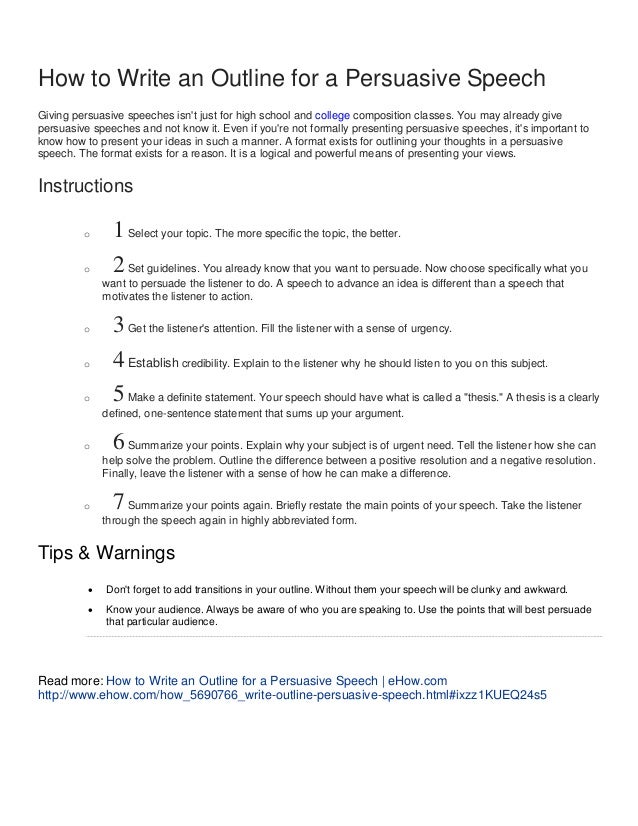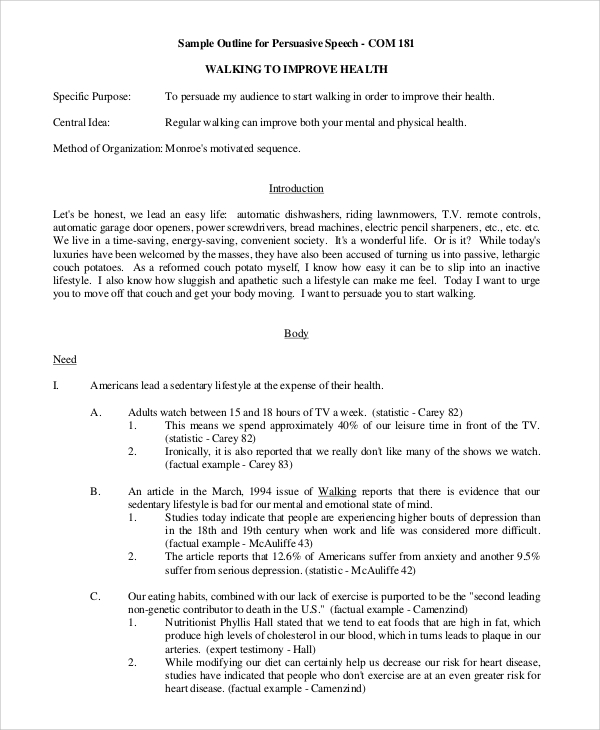Outline for Writing a Persuasive Speech Public speaking is not just a talent that some people are born with. With the proper dedication, training, and practice, anyone can become skilled at speaking in public. Many operators at an answering service have these qualities. With such an outline, you’ll get a persuasive speech a student can only dream of! All in all, your persuasive speech outline should look the following way: 3. ️ Check This Unique Template. Do you want to create the perfect outline for your speech? Follow these tips. Wingard persuasive outline 2 D. Our inactivity now may lead to inactivity later. Our choices in brand of beer will be carried on through the coming years. By being inactive now we are getting ourselves into a rut of being inactive. This rut can be avoided, but it is difficult.
Public Speaking: Outline for the Persuasive Speech
Specific Purpose: To encourage my audience into joining the One Campaign by explaining to them the three reasons why the One Campaign has a vital role in my life
Central Idea: For a better and fulfilling life, join the One Campaign.
Introduction
I. Eye-catching situation
A. Riding a bicycle for the first time needs the help of one to make another one become independent in time.
B. There are times when we couldn’t do it alone, and we need the help of someone more independent and strong.
II. Major theses
A. Helplessness and vulnerability is real and constant to anyone.
B. The One Campaign takes a vital role in my life.
C. One Campaign is the answer for a more fulfilling, happier life.
Body
I. Joining the One Campaign gives happiness to me.
A. It gives me physical happiness.
1. I become more energetic and alive.
2. I become more focused and broad-minded.
3. I become more socially aware to my surroundings.
B. It gives me emotional happiness.
1. I become more happy in doing things that pleases me.
2. I become more happy in doing things that pleases my neighbors.
3. I become more happy in doing things that pleases God.
C. It gives me spiritual happiness.

1. I become more spiritually acquainted to myself.
2. I become more spiritually acquainted to my neighbors.
3. I become more spiritually acquainted to God.
II. Joining the One Campaign gives happiness to my neighbors.
A. It gives happiness to the sick and the dying.
1. It gives happiness to people with AIDS/HIV, TB, and malaria.
2. It gives happiness to people with preventable diseases like measles, diarrhea, and pneumonia.
3. It gives happiness to people who die during childbirth.
B. It gives happiness to the naked, the thirsty, and the hungry.
1. It gives happiness to the naked.
2. It gives happiness to the thirsty.
3. It gives happiness to the hungry.
C. It gives happiness to the destitute, the homeless, and the uneducated.
1. It gives happiness to the destitute.

2. It gives happiness to the homeless.
3. It gives happiness to the uneducated.
III. Joining the One Campaign gives happiness to the world.
A. It gives happiness to Africa.
1. It gives happiness to East Africa.
2. It gives happiness to West Africa.
3. It gives happiness to South Africa.
B. It gives happiness to the eastern countries.
1. It gives happiness to East Asia.
2. It gives happiness to West Asia.
3. It gives happiness to Middle Asia.
C. It gives happiness to the western countries.
1. It gives happiness to North and South America.
2. It gives happiness to Eastern and Western Europe.
3. It gives happiness to Australia and Antarctica.
Conclusion
I. Major theses
A. Helplessness and vulnerability is real and constant to anyone.

B. The One Campaign takes a vital role in my life.
C. One Campaign is the answer for a more fulfilling, happier life.
II. Proposal
A. It takes just One to save one.
B. For a better and fulfilling life, join the One Campaign.
Bibliography

Outline For A Persuasive Speech
About the campaign. (n.d.). Retrieved May 15, 2008, from the One.org database: http://www.one.org/about/.
One Campaign. (2008). Retrieved May 15, 2008, from the Wikipedia Online Encyclopedia database: http://en.wikipedia.org/wiki/ONE_Campaign.
One Campaign: make poverty history. (2008). Retrieved May 15, 2008, from the YouTube, LLC database: http://www.youtube.com/watch?v=xVTN0jskXXg.
Quinn, R. (2008, May 14). Save the children: advocacy day. Retrieved May 15, 2008, from the One.org database: http://www.one.org/blog/2008/05/14/save-the-children-advocacy-day/.
The U.S. commitment to Global Child Survival Act. (n.d.). Retrieved May 15, 2008, from the One.org database: http://www.one.org/takeaction/us_commitment_global_child_survival_act.html.
A thesis is found in different places, including ads, debate speeches, closing arguments, etc. However, a persuasive speech is one of the most common places for it. This paper requires a strong thesis, no matter of its purpose and topic. Without a strong persuasive speech thesis statement, the main argument is weak and your information is unfocused. Learn to make a strong one because of its important role.
The definition of a thesis statement
Preparation Outline For Persuasive Speech
What is a thesis anyway? Basically, it’s a single sentence required to tie together the major ideas of your argument. It’s also a powerful statement that summarizes the chosen subject while declaring your stance. This brief sentence is written to tell readers if your persuasive speech is something worth of their attention.
Basic thesis statement types
Just like there’re different types of academic papers, thesis statements have different forms, including:
- Informative;
- Persuasive.
For instance, when writing any informative essay, you’re asked to make an informative statement to guide readers to the conclusion and declare your intentions. This type is used to show the audience a given subject and the future direction of your paper.
Most essay types, including a persuasive speech, require the statements that take a certain position and argue it. Unless the main purpose of your paper is to simply inform readers, your thesis must be persuasive. It contains a personal opinion and logical reasoning why it’s true. When you state your point of view in a persuasive thesis, this means that you choose a particular stance. Next, you explain why it’s correct with strong evidence and reasons.
Different thesis statement styles
There are 2 basic styles that can be used when writing your persuasive speech thesis statement, such as:
- A list of a few points;
- A more versatile style or an overarching point.
The first one uses a few points, and it’s ideal for any brief speech that contains only several sections (this structure is typical for many high-school assignments). For a longer persuasive speech, you require a more versatile thesis statement. It lists a single overarching point that ties all sections instead of listing a few distinct points. This thesis style has a broader scope that isn’t limited to the number of paragraphs that students can use logically.
The characteristics of a winning thesis statement
Any argumentative speech must start with a debatable claim or thesis. In other words, it should be something that other people can have reasonably different opinions on. If your statement is something generally accepted as a fact or agreed upon, there’s no point in persuading the audience. When writing a thesis, you should focus not only on the right format, but also on other important characteristics, including:
- Its length;
- A correct position;
- Strength.
A suitable thesis statement length
Your persuasive speech thesis statement can be either long or short based on how many points are included. In most cases, students write a single concise sentence that contains 2 clauses:
- A personal opinion or an independent clause;
- Reasons or a dependent clause.
Write one brief sentence about 30-40 words to meet academic requirements.
The right thesis position

A statement always belongs to the beginning of your persuasive speech because it’s a strong sentence that tells the audience what you will discuss. Most instructors have their unique preferences for a specific position of a thesis, but the rule of thumb is the end of an opening section.
The strength of your statement
For your persuasive statement to be strong, it must be arguable, so look for something that is neither obvious nor a fact that all people agree is true. Composing a thesis takes a bit more time and thought than other parts of your persuasive speech. However, it’s worth putting extra efforts to write this important sentence because it contains the main argument, directs the entire speech, and makes it focused and strong.
The purpose of a persuasive thesis
A winning thesis is the main key to writing a strong persuasive speech because it serves the following purposes:
- Presenting the chosen subject to the audience;
- Sharing your personal stance on it;
- Summarizing the main argument by offering supporting evidence.
A solid statement must capture all the above-mentioned details in a brief sentence.
How to express a personal opinion
When composing a persuasive thesis, ensure that your opinion about the chosen subject is clear because it must contain a strong claim that other people may dispute. Your statement summarizes the main argument of your persuasive speech, so your stance must be debatable and clear. Determining whether readers can oppose or challenge it is an effective method to test a thesis. If it just states the fact that others can’t disagree with, you failed to present your clear opinion.
The importance of being specific
A winning persuasive thesis is always specific and focused because the audience must know exactly what writers want to argue and why. Ensure that the statement you make is as specific as possible to end up with a good one.
Why use strong evidence and facts
Include evidence in your persuasive thesis because it helps you support a personal stance. Besides, this is how you tell others that you understand the chosen subject and you did some research to get more credibility as an author. This effective strategy also creates a helpful road map for readers to let them know the facts that you will discuss in more details. In this case, they also know right away what your personal point of view is and what proofs you provide to back it up in your persuasive speech. Finally, your thesis must answer such key questions as:
- Why?
- How?
Otherwise, it’s too open-ended and must be revised.
Comments are closed.